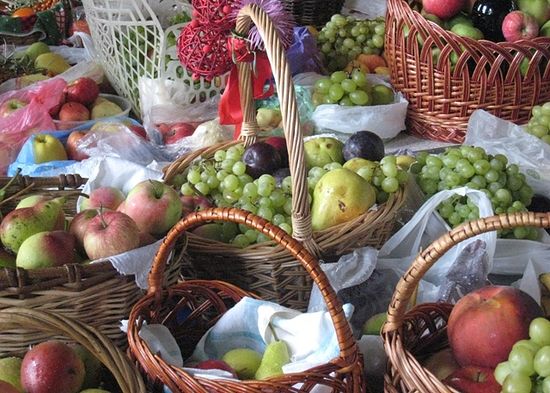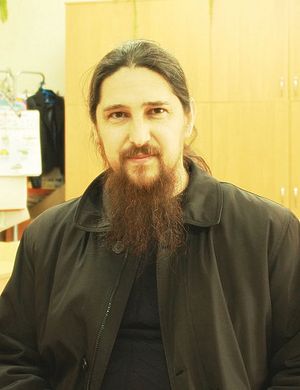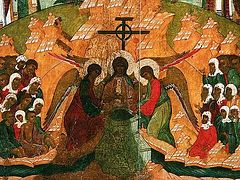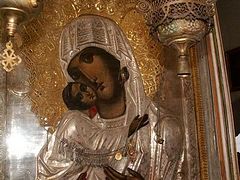Today Orthodox Christians begin the Dormition Fast, preparing themselves for the bright and joyous feast of the Dormition of the Mother of God. A correspondent for Pravoslavie.ru asked several clergymen of the Russian Orthodox Church to talk a little for our consolation and edification on this brief fast, which is strict, but not as strict as Great Lent.
“The Dormition of the Mother of God is the Pascha of the Theotokos”
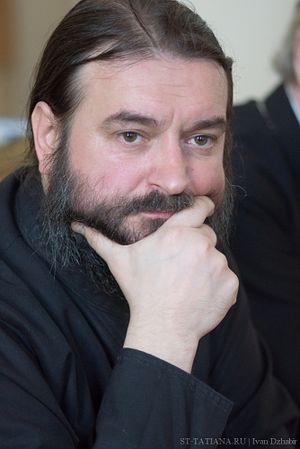 Archpriest Andrei Tkachev. Photo: st-tatiana.ru
Archpriest Andrei Tkachev. Photo: st-tatiana.ru —I would like that people would understand who they are fasting for. The Dormition of the Mother of God is the Pascha of the Theotokos. And the fast is a preparation for the Pascha of the Theotokos. This is the feast of her mortal sleep and her resurrection from the dead by her Son. Because the Orthodox love the Most Holy Theotokos so much, we would like to ask for the sake of the Mothers of God’s love for us and our love for her that those who are going to fast for these fourteen days might fast in remembrance of the Most Holy and Most Pure and Blessed Virgin Mary, and bring our labors according to our strength as a sacrifice for her.
“How wonderful it is if for the sake of the Mother of God one renounces at least one sinful habit!”
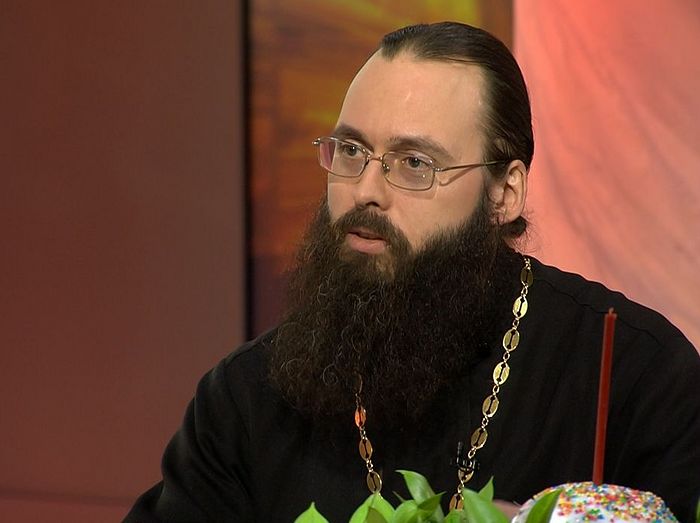
—The Dormition fast is a fast that a Christian keeps for the sake of the Mother of God. After all, it is just before the feast of the Dormition, when the Most Holy Virgin passed over into the Heavenly world, and became the Protectress and Intercessor before God for all of us. We fast for the sake of greeting this great feast.
Usually we ask the Most Holy Theotokos for various mercies and help, and we want her to ever protect and cover us. But what are we ready to do for the sake of the Mother of God? After all, true love is always expressed by some kind of sacrifice, in which for the sake of the one we love we do not hesitate to give something of our own. What can we bring as a gift to the Most Holy Theotokos? She has no need of anything earthly, or of any sort of earthly sacrifices, and that means that we should work on ourselves, cut off from our souls everything in us that is not pleasing to God. How wonderful it would be if during the Dormition fast one would for the sake of the Mother of God renounce at least one sinful habit! How good it would be if we were to strive to manifest at least some semblance of the humility and obedience to God that the Most Holy Virgin had!
Of course the fast is always a time of repentance, and it is no accident that the Dormition fast is just as strict as Great Lent. But it is worth understanding what correct repentance is. There is a parable: One man wanted very much to thank God and he prayed, “Lord, what shall I give You?” And God suddenly answered him, “I don’t need anything. Everything you have is Mine anyway—I gave it all to you.” But the man insisted: “How can I thank You, what can I give You?” Then God said, “If you love Me, then give me your sins.”
Repentance is not a torment for man, but the cleansing away of his unneeded, sinful layers. This is the freeing of a person from what is not his, what is extraneous to him, and what brings him only torment and burden. If an air balloon is burdened with extra weight it will not rise up to the sky. It is the same with man. In the sacrament of confession, God takes a person’s sins away and burns them, so that that person would spiritually rise up.
Every time we enter the time of the fast we must remember that this is a time of special repentance; that is, of freeing the soul of its burden of sins. And only with a clean soul can we stand before the Heavenly Queen on the great feast of the Dormition.
At the same time, the Dormition fast is a very joyous fast. It is distinguished by its inimitable church feasts and traditions. On the first day of the fast, August 1/14, there is the Carrying out of the honorable wood of the Life-Creating Cross. That is, right away we turn to the Honorable Cross as to the main spiritual weapon in our unseen warfare. On this day new honey is blessed; and so the Dormition fast is not so bitter. On August 6/19 is the “Savior of the apples” [the Transfiguration]; in the churches the fruits are blessed, and what is pleasing to the taste is united with God’s invisible grace. The Lord shows mercy to our bodies as well as our souls.
But most importantly, these are days when we truly have the opportunity to become closer to the Mother of God, our troubled souls find tranquility beneath her grace-filled protection and are made worthy to be partakers of the Kingdom into which she entered on the day of her blessed Dormition.
“Conscious spiritual life is that fullness of human life to which we are called.”
Priest Dimitry Shishkin, rector of the church of the Protection of the Mother of God in the village of Pochtovoe, Crimea.
—Maybe this sounds strange, but a fast, especially a long one, about which one knows beforehand and, generally speaking, “counts the days” leading up to it, is as far as I know considered by the majority of Orthodox Christians not as some burdensome duty that they have to endure “out of obedience”, but as a happy opportunity to change, to transform their own lives. For many of us feel that we are not only far from the ideal, but even from the beginnings of a true Christian life. And knowing this, each of us wants to somehow gather his forces, to become at least for a time stricter with ourselves, because without such concentration spiritual life is completely impossible, and it remains only for us to sigh about it. This is also not so bad, but clearly not enough. And long fasts give us this wonderful opportunity; they impel us lazy and enervated people to be more concentrated; they inspire us for a small but necessary labor. Thus, for the majority of consciously believing people the fast is a desired and awaited time. And the mystery of this expectation consists in consciously restraining our “fleshly man” with all of his “passions and lusts”, and beginning to live differently. This is hard to convey in words, but it is precisely this participation in another reality, the reality of true spiritual life, that makes the fast so desired by many Christians who are weighed down by their everyday, earthbound enervation.
The Dormition fast is considered a strict fast, but each of us can and should choose his own measure of strictness, because in the finally analysis it is not so important how many points of the typicon you’ve observed but how much you have personally labored and made efforts to come closer to God, to partake of His grace. In this is the meaning of the fast. One can speak (of course relatively) about the “higher” and “lower” levels of strictness. However these concepts have no relation to the value of the person himself, but only to the measure of abstinence he has chosen. According to the monastic typicon, during this fast food is taken only once a day except on feast days, and no earlier than at three o’clock in the afternoon. And this means xerophagy—that is, food without added oil.
Well, and the “lower” level, that is, the more widespread and generally accepted rule for laypeople, is refraining from animal products. The amount and frequency of the meals is something each chooses for himself. Incidentally, it is understood that the fast relates not only to food but also to abstaining from everything that hinders us in our spiritual life. And in our times these hindrances are as a rule bound up with computers, television, and the habit of all kinds of entertainment… By the way, this habit so strongly eats into our nature, even in the little things, that when we try to limit ourselves in many as if “inoffensive” things that nevertheless distract and enervate the soul, it becomes a very tangible difficulty—and of course useful experience. And so we all have something we can abstain from if only we would take a look at ourselves, at our lives honestly and soberly, from the Christian point of view. But abstinence is still not everything. As it is written in the Scriptures: “Turn away from evil and do good.” So, the fast is not only a time of abstaining from sin, but also a time of more consciously and zealously fulfilling Christ’s commandments. This is a blessed and joyful labor. And this joy, I think, is the main consolation that a person finds in the fast. It is the joy and partaking in a different life, the life of Christ Himself. And what can be more joyous than this! At the onset, when a person begins to fast, it can happen that he goes through “withdrawal”: His mood is terrible, everything seems to go wrong, all is boring and dreary… This is our fleshly man, who is upset that we’ve stopped trying to please him; and because he has already almost completely taken over the soul, the soul languishes and feels tormented. But if it remains steadfast in its resolve to continue the fast for Christ’s sake, seeks true renewal and participation in the grace of the Holy Spirit, then soon another reality is revealed, and a different, and, alas, largely unknown life begins. When the flesh continues to languish over the “injury” done to it, this languishing no longer takes precedence over the soul but abides in an as if submissive state. But the soul opens up to a greater degree than usual through the fresh breeze of grace, and learns by experience of the sweetness of repentance and prayer. The person basically begins to live that spiritual life to which he is called, but the understanding of which he has unfortunately lost due to his constant, total immersion in daily vanity.
The experience of fasting helps us to understand that conscious spiritual life is in fact that true, normal, and full-fledged human life to which we are called. It is a life filled with a special joy that is incomprehensible without fasting and prayer. It is the joy of communion with God. So, may we have a pleasant journey, and may the Lord bless us!

